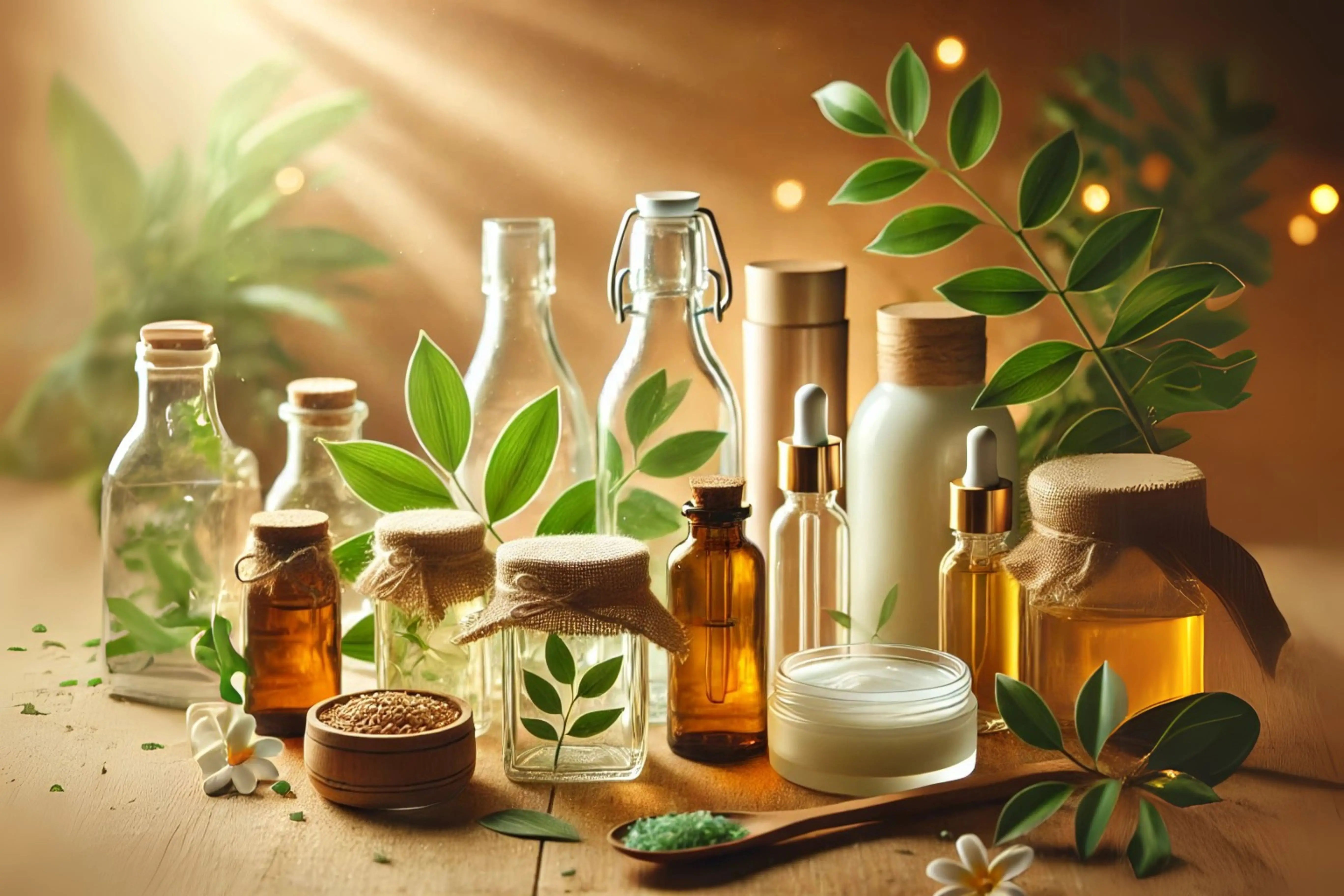Glass containers are a staple in everyday life, from preserving beverages to packaging beauty products. But have you ever wondered how these versatile containers are made? The journey from raw materials to high-end glass bottles is both fascinating and intricate. Let's break down the process into easy-to-follow steps while highlighting the sustainable practices shaping the industry.
Raw Materials: Is glass made out of sand?
Yes, glass is primarily made from sand, specifically silica sand (silicon dioxide or SiO₂). Silica sand is the main ingredient in the glass-making process due to its high silica content and heat-resistant properties.
However, sand alone is insufficient to create the durable and transparent glass used in everyday products. Additional materials are added to enhance the glass's properties and lower its melting point:
- Soda Ash (Sodium Carbonate): Lowers the melting temperature of silica, making the process more energy-efficient.
- Limestone (Calcium Carbonate): Improves the durability and stability of the glass.
- Cullet (Recycled Glass): Speeds up the melting process and increases sustainability by reducing energy consumption.
When these ingredients are combined and heated in a furnace at temperatures exceeding 1700°C (3092°F), they melt into a molten state. Upon cooling, this mixture solidifies into glass.
So, while silica sand is the key component, glass requires a blend of materials and precise conditions to achieve its functional and aesthetic qualities.
How does sand turn into glass?
Melting, forming, and annealing are the crucial steps that turn sand into glass. Glass bottle production involves heating the raw materials, shaping the molten glass, and then carefully cooling it to ensure durability and strength. Each step is essential in creating the transparent and versatile material we use daily. Below, we will explore each step in detail.
Melting: The Transformation Begins
The raw materials are measured and mixed into a batch, which is fed into a furnace heated to approximately 1700°C (3092°F) through the batch charger. At this stage, the materials melt into a molten state.
Coloring and Additives:
- Metal oxides can be added to produce various colors:
- Green: From iron oxide or chromium.
- Brown/Amber: From sulfur or iron.
- Blue: From cobalt oxide.
- Additional substances can enhance durability or clarity, depending on the bottle's intended use.
Forming: Shaping the Glass
Once molten glass achieves the right viscosity, it's shaped into bottles using two main techniques:
a. Blow-and-Blow Process
- It is commonly used for narrow-neck containers like soda or beer bottles.
- Steps:
- Molten glass is dropped into a parison mold to create a preliminary shape.
- Air is blown into the glass, expanding it into the desired bottle shape.
b. Press-and-Blow Method
- Used for wide-mouth containers like glass jars.
- Steps:
- A plunger presses molten glass out to fill the blank moulds and take its shape.
- Air completes the forming process.
Both methods involve automated machinery that produces consistent results at high speeds. Individual Section machine or IS machine is the most widely-used forming machine arrangement.
Annealing: Strengthening the Glass
After shaping, the bottles undergo annealing, a controlled cooling process to make the bottle stronger. This step eliminates internal stresses caused by rapid temperature changes during forming. Bottles pass through an annealing lehr, where they are gradually cooled to ensure durability and thermal stability. Without annealing, bottles are more likely to crack or shatter.
Inspection and Quality Control
Modern factories use advanced technology to ensure every bottle meets stringent quality standards. Common inspection steps include:
- Checking for defects like bubbles, cracks, or uneven thickness.
- Verifying color consistency.
- Ensuring precise dimensions for proper capping or sealing.
Some facilities use AI-powered systems to inspect thousands of bottles per minute, minimizing errors.
Surface Treatments and Customizations
Before leaving the factory, bottles may undergo surface treatments:
- Coating: Adds resistance to scratches or improves shine.
- Embossing/Debossing: Creates branded designs directly on the glass.
- Labeling: Adds visual appeal and critical product information.
Packaging and Distribution
Once inspected and treated, bottles are carefully packed using protective materials to prevent breakage during shipping. Sustainable packing solutions, like biodegradable wraps or reusable crates, are gaining popularity to reduce environmental impact.
Innovations in Glass Bottle Manufacturing
The glass industry is evolving with new technologies aimed at reducing waste and energy use:
- Lightweight Glass: Reduces material use while maintaining strength.
- Smart Glass: Embeds tracking chips for better inventory management.
- Eco-Friendly Furnaces: Use renewable energy sources like solar or biomass.
Manufacturers also invest in circular economy practices, emphasizing recycling and reuse to limit environmental harm.
The Traditional Process
How was glass first made traditionally? The traditional process of glass bottle is a long and tedious one. It involves heating the sand, adding coal and limestone, melting them together to form Glass, and then blowing the molten Glass into a bottle shape. It involves four steps:
- The first step in this process is to take molten Glass and blow air into it to form a long cylinder shape.
- The second step is to let the cylinder cool for about 3 hours.
- Third, you'll need to remove the cap from the cylinder and then the base, leaving you with very few pieces of glass at both ends.
- The fourth and final step is to reheat this small piece of glass at both ends so that it melts together and creates an opening for the bottle's necks.
This traditional method was labor-intensive, requiring skilled artisans to craft each bottle by hand. Today, modern machinery has streamlined these steps, but the core principles remain the same.
The Modern Process
The modern glass bottle-making process is complex. The first stage in this process is the raw materials needed for production. These include sand, soda ash, and limestone. Next, the raw materials are heated at high temperatures to create molten Glass, filtered through an edging machine to give it the desired shape before being molded and blown into a bottle shape from a large steel mold.
- The modern process of making a glass bottle starts with melting sand and limestone. The mixture is then heated until it becomes a liquid.
- Once the mixture has been heated, it is cooled and fed into a machine known as a blow molder. The machine takes the molten Glass and blows it into an empty bottle shape.
- After that, the bottle is given its final touches by hand before being cooled in water or air to remove any excess heat.
Frequently Asked Questions (FAQ)
Q: Why is recycled glass (cullet) important?
Recycled glass melts at a lower temperature, saving energy and reducing greenhouse gas emissions. It also decreases the need for raw materials.
Q: How are different bottle colors created?
The color depends on the metal oxides added during melting. For example, cobalt oxide creates blue bottles, while iron oxide produces green or brown bottles.
Q: Can glass bottles be handmade?
Yes, artisans use manual methods like blowing and pressing to create unique glass products, but most bottles are mass-produced for efficiency.
Conclusion: The Timeless Appeal of Glass Bottles
From molten sand to intricate designs, glass bottles are a marvel of engineering and sustainability. Their durability, recyclability, and aesthetic appeal make them an essential material across industries. By understanding the manufacturing process, we gain a deeper appreciation for these everyday objects and their role in promoting a greener future.




